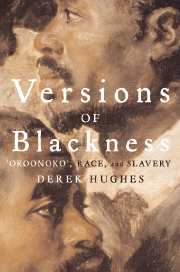Book contents
- Frontmatter
- Contents
- Introduction
- A Note on the Texts
- Chronology
- PART ONE THE MAJOR TEXTS
- PART TWO CONTEXTS: EUROPE, AMERICA, AND AFRICA
- A Short Account of the Destruction of the Indies
- Democrates Secundus
- “Of the Cannibals” and “Of Coaches”
- On Spreading the Gospel Among the Savages
- The English-American his Travail by Sea and Land
- A True and Exact History of the Island of Barbados
- The History of Sir Francis Drake
- Voyage de la France Equinoxiale en l'Isle de Cayenne
- An Exact Relation of the Most Execrable Attempts of John Allin
- The History of the Caribby-Islands
- Histoire Generale des Antilles Habitées par les François
- An Impartial Description of Surinam
- Great Newes from the Barbadoes
- The Negro's and Indians Advocate
- Friendly Advice to the Gentlemen Planters of the East and West Indies
- DISCUSSIONS OF COLONIALISM
- Bibliography
- Index
The History of Sir Francis Drake
Published online by Cambridge University Press: 05 June 2012
- Frontmatter
- Contents
- Introduction
- A Note on the Texts
- Chronology
- PART ONE THE MAJOR TEXTS
- PART TWO CONTEXTS: EUROPE, AMERICA, AND AFRICA
- A Short Account of the Destruction of the Indies
- Democrates Secundus
- “Of the Cannibals” and “Of Coaches”
- On Spreading the Gospel Among the Savages
- The English-American his Travail by Sea and Land
- A True and Exact History of the Island of Barbados
- The History of Sir Francis Drake
- Voyage de la France Equinoxiale en l'Isle de Cayenne
- An Exact Relation of the Most Execrable Attempts of John Allin
- The History of the Caribby-Islands
- Histoire Generale des Antilles Habitées par les François
- An Impartial Description of Surinam
- Great Newes from the Barbadoes
- The Negro's and Indians Advocate
- Friendly Advice to the Gentlemen Planters of the East and West Indies
- DISCUSSIONS OF COLONIALISM
- Bibliography
- Index
Summary
Sir william davenant (1606–68) began his career as a playwright in 1629 and provided masques (that is, ceremonial theatrical entertainments) for Charles I's court, succeeding Ben Jonson as poet laureate in 1637. In that year, he wrote a poem supporting an abortive scheme to establish a colony in Madagascar, in which the King's cousin Prince Rupert was involved.
Davenant acted as a royalist soldier and agent during the Civil War and in 1650 was captured by Parliamentary forces while sailing to Virginia. For a while he was in serious danger of execution. He came to terms with the Puritan regime and a few years later circumvented the ban on theatrical performances by staging pieces of musical theater, which included The History of Sir Francis Drake and The Cruelty of the Spaniards in Peru (both in 1658, and later included in his entertainment, The Playhouse to be Let [1663]). These works portray the New World as groaning under Spanish oppression and ready for liberation by the magnanimous British. Although both plays capitalize on Cromwell's recent colonial adventure in the Caribbean, The Cruelty of the Spaniards also glances at events in Britain, portraying Peru as a nation in which civil war leads to the murder of the king. Much of the play, however, concerns European fantasies of the New World, as a place in which the Golden Age is still a living memory. Like Oroonoko, it is both about Britain and not about Britain.
- Type
- Chapter
- Information
- Versions of BlacknessKey Texts on Slavery from the Seventeenth Century, pp. 307 - 312Publisher: Cambridge University PressPrint publication year: 2007



